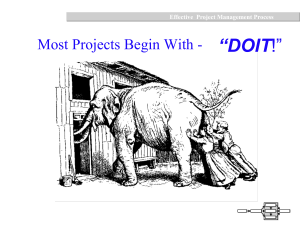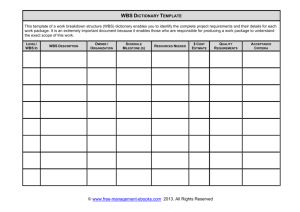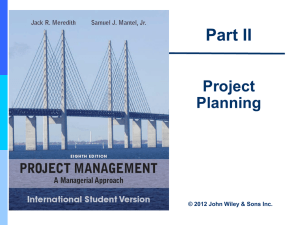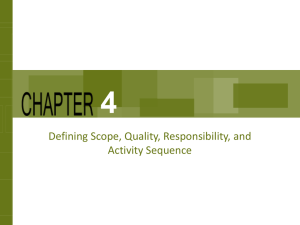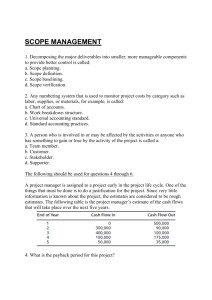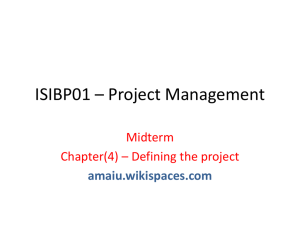Work Breakdown Structure Basics
advertisement
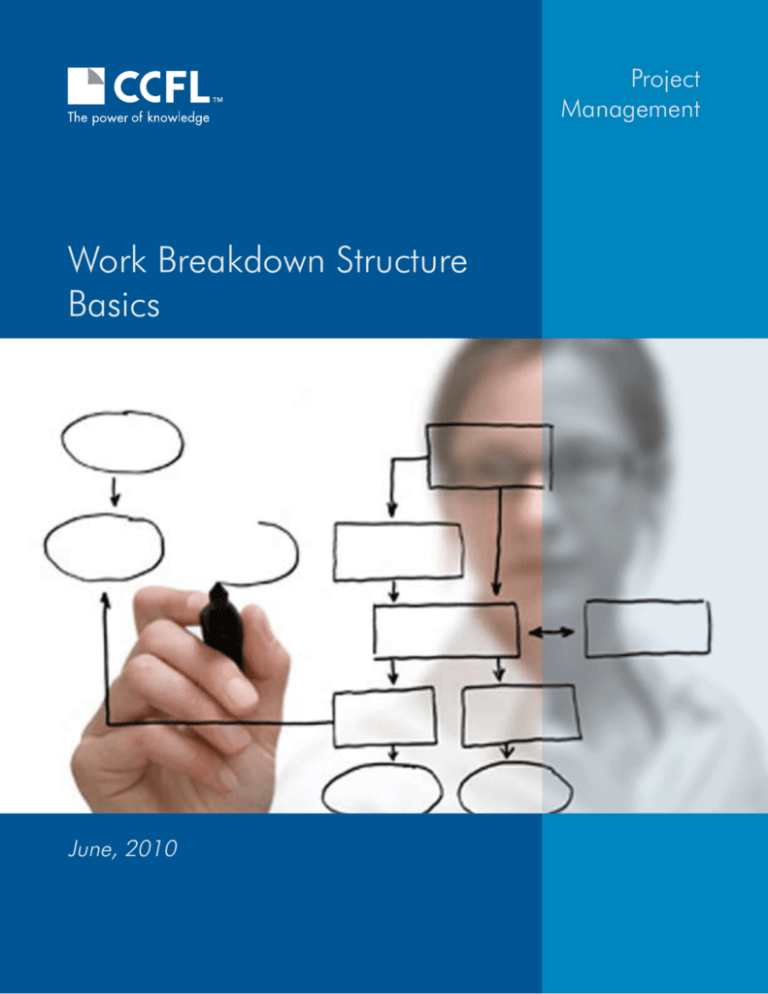
Project Management Work Breakdown Structure Basics June, 2010 Work Breakdown Structure A Work Breakdown Structure is the foundation of project planning. It is a tool for breaking down a project into its component parts and then detailing the specific tasks and activities required to create each of these parts. The structure of the WBS can vary, sometimes using project life cycle phases or other times project deliverables. A WBS is: • An “end item” – deliverable oriented. It does not show the dependencies or durations of activities; • An organized, “outline” representation of all work to be performed; • Detailed enough to support planning, costing, estimate of time durations, assignment of roles and responsibilities and ongoing monitoring and control; • Provides a complete picture of all activities needed to complete the project. Note that each component includes 100% of the work required to achieve that end product; • Reusable – once it is created for a project, it can be reused as a template on other, similar projects. The benefits of WBS are to: • Provide a detailed illustration of project scope. All work is identified and communicated to stakeholders; • Provide a tool to allow the team to see and understand the whole project; • Create accurate cost and schedule estimates; • Assist with buy-in by offering the project teams a way to see where their work fits into the overall project. Creating a WBS The WBS starts with the highest levels of work in the project. Each lower level breaks the groupings into smaller chunks. The breakdown continues to as many levels of detail as you need. There is no fixed number of levels for a “proper“ decomposition. Process for creating a WBS: 1. Review the Project Initiation Worksheet; 2. Create summary tasks by identifying specific project deliverables: products, services, results; 3. Identify “other work areas” that may fall outside of these defined areas; 4. Subdivide each summary area into levels detailed enough for managing & controlling; 5. Develop specific tasks and activities required to create the products, services and results; 6. Tasks required to achieve the summary task are indented beneath it; 7. Tasks both summary and sub should be outlined numbered. Remember that the WBS is a logical grouping of all tasks required to achieve the summary tasks. The tasks are not necessarily performed in the sequence in which they are numbered. Project Management Work Breakdown Structure Basic 1 June, 2010 Definitions: • Code of Accounts - a unique lettering or numbering system in which letters or numbers are assigned to each unique component of the work breakdown structure. • Conditional activity - an activity performed if certain conditions happen. There are no conditional activities in a WBS. Either define possibilities as a single activity or assume the number of revisions you think will be needed. • Deliverable - the output of a completed task or activity. • Milestone - a milestone is a scheduled event signifying the completion of a major deliverable or a set of related deliverables. • Rolling Wave Planning - it is a process of progressive planning where near-term work is planned in more detail than work that is planned in the future. • Task - a piece of work requiring effort, resources and having a concrete outcome. • Work Breakdown Structure Dictionary - supports the WBS and includes detailed information about each component in the WBS. It may include: code of account identifier, statement of work, responsible organization, list of schedule milestone, associated schedule activities and resources required. • Work Package - a portion of the project that can be assigned to an organization, functional discipline or individual for completion. It may be subdivided into tasks and subtasks. Work packages should have clearly defined ownership, defined start and end dates, results that can be comported to expectations, a specific budget, hours of completion or other measurement, a structure that economizes/minimizes on documentation. Project Management Work Breakdown Structure Basic 2 June, 2010 Examples of WBS Project Management Work Breakdown Structure Basic 3 June, 2010
